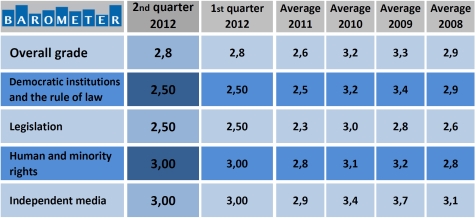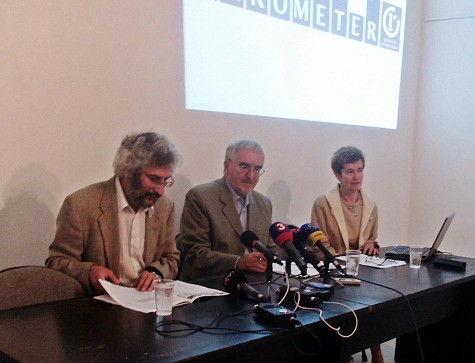On July 12, 2012 Institute for Public Affairs posted on an assessment of the development of the quality of democracy in Slovakia for the second quarter of 2012.
Within the project IVO Barometer, analysts from Institute for Public Affairs in cooperation with other experts evaluate the quality development of democracy in Slovakia in the second quarter of 2012 by overall mark 2.8.
Experts preparing the assessment within IVO Barometer found that the overall rating in the second quarter of 2012 did not change compared to the previous period as a consequence of the unchanged score in each analyzed area.
In most of the areas, concerning an assessment of developments in the second quarter of the year 2012, no such major improvement or deterioration in the quality of democracy had place, which would result in a shift in the rating, although in some areas (namely, in the area of protection and respect for human and minority rights and independent media and media of public services) the negative tendencies were observed. In case of further persistence of these trends in the next period, it may lead to the worsening of the rating.

Download
IVO Newsletter - Barometer: 2nd quarter of 2012 (Slovak only)
IVO Barometer
The principal objective of the IVO Barometer, an analytical project by the Institute for Public Affairs, is to provide a foundation of basic knowledge about the actual state of affairs and development trends in the field of quality of democracy, and to put together an operative team of experts and regularly publish their assessments.
The backbone of the project is the regular evaluation of the quality of democracy in Slovakia after it became a full-fledged member of the European Union. The project’s methodology is based on systematic monitoring and analysis of the main development trends in five key areas: democratic institutions and the rule of law; legislation; projection and implementation of human and minority rights; performance of independent and public service media; and civil society.
Photo

IVO Barometer 2/2012 was introduced on a press conference by Grigorij Mesežnikov, Martin Bútora and Zora Bútorová
The project is supported by the Embassy of the United States of America, Konrad Adenauer Stiftung and the British Embassy.
***
SITA news agency released two press reports:
IVO Says Quality of Democracy in Slovakia Unchanged after Elections
BRATISLAVA, July 12, (SITA) -- The quality of democracy in Slovakia in the second quarter of this year, following the replacement of the government of Iveta Radicova by the government of Robert Fico, remained on the same level as in the first quarter of this year. This stems from the regular report of the Public Affairs Institute (IVO) titled IVO Barometer. Both quarters received the same evaluation at 2.8. “This government has taken up power in line with legal stipulations,” said Grigorij Meseznikov of IVO. In the area of protection and respect of human and minority rights and independent media and public service media, some negative tendencies have been reported. If they persist, the democracy rating may deteriorate in the next period.
Individual institutions of the constitutional system have shown a sufficient level of flexibility, functionality and effectiveness. However, political problems persisted at the General Prosecutor’s Office, in the Judicial Council and some courts. IVO negatively perceives attempts to influence the decision in the elections of new Judicial Council members. “By disclosing his favored candidates, the Supreme Court President and Judicial Council Chairman tried to influence the elections, and thus violated the principle of impartiality,” Meseznikov commented.
IVO Survey: Slovaks Trust the President Most from Among Institutions
BRATISLAVA, July 13, (SITA) -- While the credibility of the institution of the head of state has reached its lowest level since Ivan Gasparovic was first elected to office in 2004, Slovaks still trust the president most from among state institutions. This is the outcome of a survey of the think tank Public Affairs Institute (IVO), which took place in early June in cooperation with the agency FOCUS on a representative sample of 1,026 respondents. In June 2012, the president remained the only top-level state institution, which has retained the confidence of a majority of the people (61 percent). "This stems from the fact that trust in the president is not as politically polarized as trust in the cabinet or parliament," said Zora Butorova of IVO.
After this year's early parliamentary elections compared to the autumn of 2011, trust increased in the cabinet and the parliament in the eyes of the Slovak population (from 29 percent to 44 percent and from 31 percent to 42 percent). However, despite this positive turn, the share of those who do not trust either institution exceeds the share of those who trust one of the institutions. The credibility of both constitutional institutions returned to levels before the elections in 2010. Trust in the cabinet reflects most the respondents’ favor for one of the political parties. Trust in the current government was expressed by eight out of ten supporters of SMER-SD, but only three of ten voters of the opposition parties, and this proportion are lowest among SDKU-DS voters (19 percent).
Confidence of citizens toward the Constitutional Court Slightly took a moderately positive development, which since October 2011 increased from 37 percent to 43 percent. Of four other institutions studied, non-governmental organizations have the highest trust of 40 percent, followed by trade unions (38 percent). Courts in Slovakia suffer a long-term deficit of trust. In June 2012, courts were considered trustworthy by only 28 percent of respondents, which is even less than in late 2010, when it was 33 percent.
The public has a long-term very critical view of political parties. In June 2012, 77 percent of respondents did not trust political parties while only 17 percent trusted them.
The leader of the SMER-SD Robert Fico has for long topped the ranking of credibility of politicians. Last month, 30 percent of respondents said they trusted him. Far behind him is deputy chairman of SMER-SD and Interior Minister Robert Kalinak (12 percent), who achieved the same credibility level as before early elections, in January 2012. IVO notes that as much as 39 percent of the people surveyed do not trust anyone, or could not give state any such personality. "The proportion is higher than before the elections, which may reflect the frustration of some people from their results, but also less interested in Butorova said and added that a similar trend was also reflected after the elections in 2010.